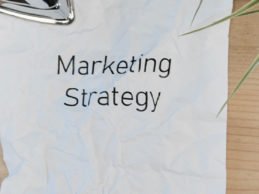
As a business owner, you're typically the one most responsible for sales for your business. I don't know about you, but I hate sales. I really don't like selling. However, if you don't sell your business, you'll be hard-pressed to find someone else to sell it for you. So time to buck up and bring in some dolla dolla bills, y'all. Pull up your big girl panties and let's do the dang thing, here are a few things I've learned about business development for small businesses over the last few years.
8 Tips on Business Development for Small Businesses
- Not all clients are created equal. Often times the clients that pay you the least will take up the most of your time.
- Disqualify prospects as quickly as you can. My friend and mentor, Andy Crestodina from Orbit Media, shared this with me when I first started Brainchild Studios. I thought he was crazy. But, per usual, he was right. The more time you spend entertaining prospects that aren't in your sweet spot, the less time you're spending on the prospects that you are positioned to knock out of the part and surprise and delight.
- Don't forget to account for your own time. I spent the full second-year Brainchild Studios was in business working for free for our largest account because when I created the 12-month contract, I never accounted for my own time. Huge learning opportunity. Your time matters and time is money.
- Time is money. I don't like billing by the hour if I can help it, because I don't like limiting the amount of money someone can make. But think about this when it comes to your own time too. Think about the value you're adding given the fact that you've spend 5-10-15-20 years in your field. Just because you can knock out a project in 10 hours and it would take someone more junior 40+ hours doesn't mean you should make less. If it's worth $5k, then it's worth $5k and you just make $500/hour. Teach me your waaaayssss.
- Address your full target audience spectrum. Make sure you have a plan in place to address your Macro audience (typically known as the top of the marketing funnel and where you create awareness of your brand). Have a plan for the Micro audience (typically known as the Consideration phase of the marketing funnel). Ensure the Nano audience gets special love and attention, this is your shortlist, so close to purchasing. And last, but definitely not least, don't forget about your current clients. Don't forget to take care of those who have already signed on the dotted line. It's much easier to sell more to someone who has already said yes than to try and convert someone new. Take care of your people and they'll reciprocate. Credit for Macro, Micro, Nano, Existing goes to Drew McClellan at Agency Management Institute.
- You're not selling. You're solving problems. I hate sales. I hate selling, yet, I'm responsible (to date) for all the sales of my company's history thus far. However, in 2018, Kevin Baumgart, one of the best sales folks I've ever met, changed my whole world. He asked me if I believed in what we do and the services we provide. Obviously, I said yes. Then he said, "Then you're not selling. You're helping to solve people's problems." And he was so right. So if you're like me and hate selling, remember that you're not selling, you're doing people a favor and solving their problems.
- It's ok if you're not the right fit. Just call it as soon as possible so you don't waste your time or theirs. Don't be desperate for every dollar out there because some dollars cost more than others. And it also creates a less stressful environment if you enter a discovery call as just an exploratory conversation to see if you're a good fit for them to help solve their problems and if they're the type of client you'd like to work with. If you're not the right fit, no biggie. Just call it like it is and see if you can provide a recommendation for someone else who might be. Never hurts to extend the olive branch to others in your industry.
- It's the thought that counts. People just want to feel like they matter, they're seen, heard and appreciated. So when building relationships, even something as small as a hand-written note can go a long way.
Check out my other recommendations and lessons learned on business basics, branding/marketing, finances, and the operations and systems of starting a small business! And if you'd like a full step-by-step guide on how to start your online/virtual business, I documented all of those steps in great detail in my Work From Home Playbook, so check that out too!
Remember, you're not selling, you're solving a problem. Go get'em tiger.

Kiley Executive Coach & Consultant
Kiley Peters is a serial entrepreneur, national speaker, executive coach, and small business consultant. Having personally counseled over 100 small and medium-sized businesses on operations, business development, digital marketing, and consumer behavior analysis over the last 17 years Kiley is incredibly passionate about serving small business owners. She is the Founder and CEO of Brainchild Studios, a research and business strategy partner for small businesses and mid-market executives, and also created the Work From Home Playbook, a series of online courses guiding aspiring entrepreneurs through the steps of starting a virtual business. With these experiences in her back pocket, she understands the challenges and struggles small business owners encounter.
more posts by Kiley →Related posts
-
 Entrepreneurship, Resources
Entrepreneurship, Resources -
 Entrepreneurship, Resources
Entrepreneurship, Resources -
 Entrepreneurship, Resources
Entrepreneurship, Resources -
 Entrepreneurship, Resources
Entrepreneurship, Resources -
 Entrepreneurship, Leadership, Resources
Entrepreneurship, Leadership, Resources -
 Entrepreneurship
Entrepreneurship -
 Life, Entrepreneurship, Leadership
Life, Entrepreneurship, Leadership -
 Entrepreneurship, Leadership
Entrepreneurship, Leadership
